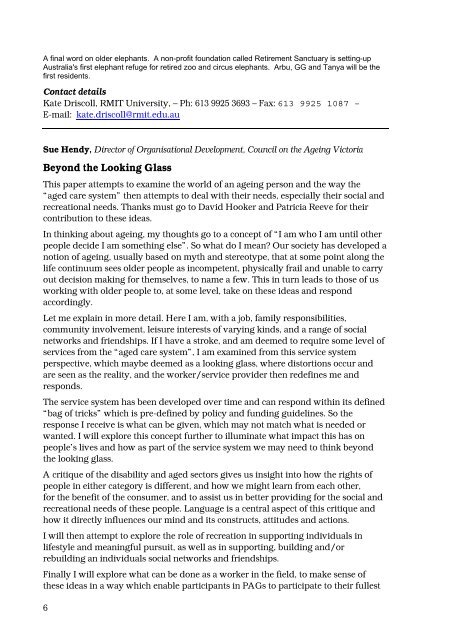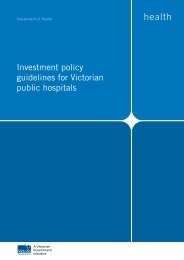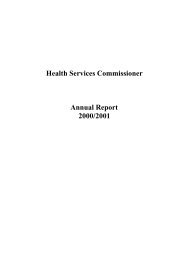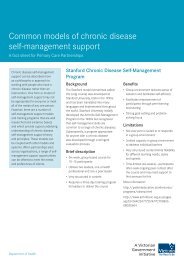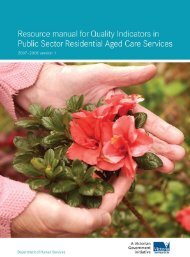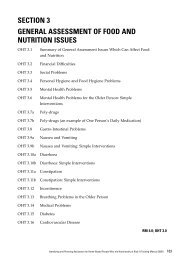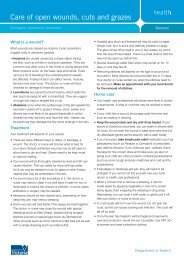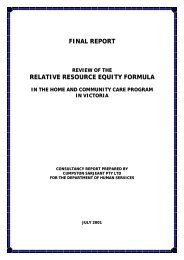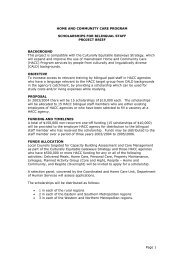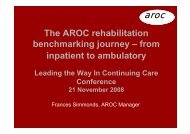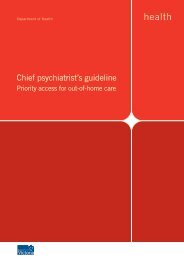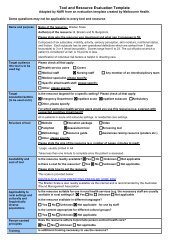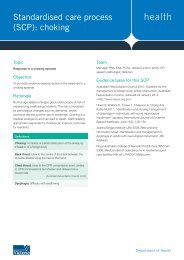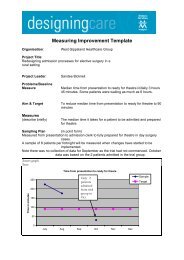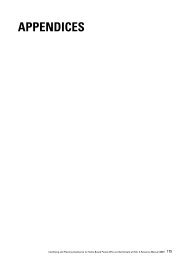Abstracts & Presentation Summaries - Department of Health
Abstracts & Presentation Summaries - Department of Health
Abstracts & Presentation Summaries - Department of Health
You also want an ePaper? Increase the reach of your titles
YUMPU automatically turns print PDFs into web optimized ePapers that Google loves.
A final word on older elephants. A non-pr<strong>of</strong>it foundation called Retirement Sanctuary is setting-up<br />
Australia's first elephant refuge for retired zoo and circus elephants. Arbu, GG and Tanya will be the<br />
first residents.<br />
Contact details<br />
Kate Driscoll, RMIT University, – Ph: 613 9925 3693 – Fax: 613 9925 1087 –<br />
E-mail: kate.driscoll@rmit.edu.au<br />
Sue Hendy, Director <strong>of</strong> Organisational Development, Council on the Ageing Victoria<br />
Beyond the Looking Glass<br />
This paper attempts to examine the world <strong>of</strong> an ageing person and the way the<br />
“aged care system” then attempts to deal with their needs, especially their social and<br />
recreational needs. Thanks must go to David Hooker and Patricia Reeve for their<br />
contribution to these ideas.<br />
In thinking about ageing, my thoughts go to a concept <strong>of</strong> “I am who I am until other<br />
people decide I am something else”. So what do I mean? Our society has developed a<br />
notion <strong>of</strong> ageing, usually based on myth and stereotype, that at some point along the<br />
life continuum sees older people as incompetent, physically frail and unable to carry<br />
out decision making for themselves, to name a few. This in turn leads to those <strong>of</strong> us<br />
working with older people to, at some level, take on these ideas and respond<br />
accordingly.<br />
Let me explain in more detail. Here I am, with a job, family responsibilities,<br />
community involvement, leisure interests <strong>of</strong> varying kinds, and a range <strong>of</strong> social<br />
networks and friendships. If I have a stroke, and am deemed to require some level <strong>of</strong><br />
services from the “aged care system”, I am examined from this service system<br />
perspective, which maybe deemed as a looking glass, where distortions occur and<br />
are seen as the reality, and the worker/service provider then redefines me and<br />
responds.<br />
The service system has been developed over time and can respond within its defined<br />
“bag <strong>of</strong> tricks” which is pre-defined by policy and funding guidelines. So the<br />
response I receive is what can be given, which may not match what is needed or<br />
wanted. I will explore this concept further to illuminate what impact this has on<br />
people’s lives and how as part <strong>of</strong> the service system we may need to think beyond<br />
the looking glass.<br />
A critique <strong>of</strong> the disability and aged sectors gives us insight into how the rights <strong>of</strong><br />
people in either category is different, and how we might learn from each other,<br />
for the benefit <strong>of</strong> the consumer, and to assist us in better providing for the social and<br />
recreational needs <strong>of</strong> these people. Language is a central aspect <strong>of</strong> this critique and<br />
how it directly influences our mind and its constructs, attitudes and actions.<br />
I will then attempt to explore the role <strong>of</strong> recreation in supporting individuals in<br />
lifestyle and meaningful pursuit, as well as in supporting, building and/or<br />
rebuilding an individuals social networks and friendships.<br />
Finally I will explore what can be done as a worker in the field, to make sense <strong>of</strong><br />
these ideas in a way which enable participants in PAGs to participate to their fullest<br />
6


